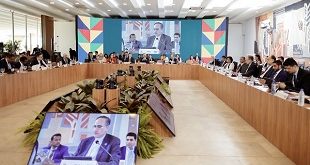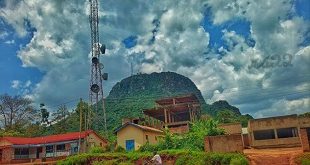
Rather than include Africa in discussions about trade, the G20 addresses narrower development issue
COMMENT | COBUS VAN STADEN | This has not been an easy year for the G20. The 2018 summit of the leaders of the world’s largest economies was held in Buenos Aires, a city still reeling from a currency collapse. More broadly, the summit took place amid a fracturing of the multilateral order. Everything from NATO to the consensus on climate change appears to be coming apart at the seams.
Still, the G20 has long positioned itself as a global problem solver, having been conceived after the 1997 Asian financial crisis and then emerging as the primary global forum for addressing the crash of 2008. A decade later, a global crisis is on the agenda once again, only this time it has assumed the form of a mounting trade war between the United States and China.
Unlike in 2008, however, the world’s capacity for multilateral decision-making is deteriorating. The European Union remains preoccupied with its own internal disputes, and the United States, under President Donald Trump, has abandoned multilateralism and weakened the institutions needed to solve complex challenges such as the threat of technological unemployment from automation. And the effects of the Trump administration’s protectionism are already being felt. The World Trade Organisation recently reported that in response to U.S. tariffs, G20 countries have imposed around 40 new import restrictions, affecting $481 billion in global trade – a sixfold increase from the year before.
But while the world’s economic giants have been withdrawing from multilateralism, Africa has been quietly moving in the opposite direction. Earlier this year, the continent’s countries agreed on a new African Continental Free Trade Agreement, and committed to pursuing deeper cross-border economic and infrastructure integration within the framework of the African Union, as outlined in the AU’s Agenda 2063.
But, despite its embrace of multilateralism, Africa has struggled to get the G20’s attention. South Africa is the only African country in the G20, and it must constantly walk the fine line of speaking for the continent’s interests without imposing its voice on its neighbours. True, representatives from the AU and the New Partnership for Africa’s Development do attend G20 summits. But the countries occupying each institution’s rotating leadership do not always have the capacity to advocate forcefully on the continent’s behalf.
Moreover, this problem is compounded by the limited scope of the G20’s interactions with Africa. Rather than including Africa in wider discussions about global trade architecture, climate change, and the future of work, the G20 has largely limited its engagement with the continent to addressing narrower development issues.
To be sure, Africa’s large infrastructure gap, slow regional integration, and high levels of unemployment all stem from underdevelopment. No one is saying that development should be ignored; but nor should it be the only focus. When international engagement with Africa is confined to the silo of development, the continent is effectively reduced to a set of problems for external actors to solve. This tendency prevents Africa from participating as a legitimate and coequal member of the global community. If one lacks a seat at the table, then one is probably on the menu.
As matters stand, most of the G20’s engagement with Africa happens through its Development Working Group, which focuses on the basic building blocks of development, like poverty eradication. This means that Africa has no say in a host of other issues relating to development, including infrastructure, the shape of the digital economy, and the global banking system. As a result, key problems such as Africa’s structural exclusion from global markets – which is due in large part to G20 member states’ own domestic agricultural subsidies – go unexamined.
This isn’t just unfair to Africa; it also poses risks for the G20. Africa represents the world’s demographic future, and its development trajectory will increasingly affect the global economy. By 2050, Nigeria will have the world’s third-largest population, and by 2100, one-third of all people will be African. Clearly, any plan that the G20 makes for the future will have to put Africa at the forefront. Diminishing the region to a set of development challenges will no longer do.
To its credit, the G20 has started paying more attention to Africa in recent years. Under the Chinese presidency in 2016, the body made industrialisation in Africa a high priority. And this was followed by the Compact with Africa under the German presidency in 2017. For its part, Argentina has not launched an Africa initiative of its own; but it has devoted attention to improving cooperation with the continent via people-to-people diplomacy.
The Compact with Africa is designed to facilitate economic reforms across the continent, and to attract investment from pools of private-sector funds in the global North. But though it has been well received among African leaders, the compact nonetheless perpetuates the trend of restricting African engagement to development issues.
Looking ahead, Africa must be afforded a greater role in setting the G20’s agenda. The continent will be disproportionally affected by climate change and transnational migration. Yet it will not be able to meet those challenges if its development is being hindered by an unequal global trade system.
These issues were on the agenda in Buenos Aires, but discussion of them was largely deprived of an African perspective. This must change. It is time for creative solutions to make the G20 more representative and more effective in its engagement with the world. Our collective future depends on it.
*****
Cobus van Staden is a senior foreign policy researcher at the South African Institute of International Affairs.
Copyright: Project Syndicate, 2018.
www.project-syndicate.org
 The Independent Uganda: You get the Truth we Pay the Price
The Independent Uganda: You get the Truth we Pay the Price




First time when we do a sit up exercise, we do not encounter any challenge.
Nonetheless, couple options a few steps adhere to when utilizing
the law of attraction. Lightening can be made at personal.